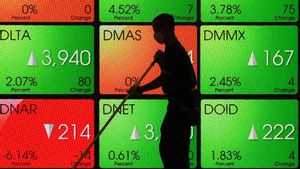JAKARTA - The sale of Sting's song catalog to the Universal Musik record company has become the focus of music observers around the world. The Dedengkot of rock group The Police may not be the first to do so, but it's still surprising because he started the year and his scores are huge.
The agreement to sell all of Sting's songs with Universal Music was reached on Thursday, February 10, 2022. The sales value was not stated, but Universal Music estimates that at least 300 million US dollars, or around Rp. 4.3 trillion.
Some of Sting's famous songs that have changed ownership include Every Breath You Take, Roxxane, Every Little Thing She Does Is Magic, and If You Love Somebody Set Them Free. The songs cover what Sting has performed with The Police as well as in his solo career.
Sting's deal with Universal Music includes copyright to all of his cataloged songs, about 600 songs, including songwriter royalties. That means Universal will be the beneficiary of all revenue from Sting's songs.

Sting himself during his career often moved record companies. But for no reason he detailed, Universal Music belongs to its competitors in the recording industry such as Sony Music or Warner Music.
“For me, it is very important to find a place where I can appreciate and respect all the work that I have produced throughout my career. This is useful not only for connecting with old fans in new ways, but also about ways to introduce my works to new fans, new audiences, new musicians, and current and future generations,” said Sting, a British man whose real name is Gordon Sumner. who is currently 70 years old, as quoted by the New York Times.
According to the agency BMI Music, Sting's Every Breath You Take in 1983 is the most played song in the catalog. Sales of the song reached more than 14 million copies.
“We are honored that Sting has chosen Universal to publish all of his work as a writer and musician, both within The Police and in his solo career. This is a huge responsibility that we must take seriously,” said Sir Lucian Grainge, CEO of Universal Music listed company from Amsterdam, The Netherlands.
The Market Potential of the Digital Age is Huge
Grainge in an interview with The Guardian in September 2021 said that the potential of the music market in the digital age is not kidding. That's why giant record companies are competing to buy the copyrights of famous musicians.
Grainge said that by September 2021, there was a potential revenue of US$45 billion, or around Rp. 651 trillion from digital music sales. According to him, that has not yet become the peak because the market potential is still very large.
The recovery of the music industry in the digital era, led by streaming broadcasts, has the potential to generate much more money in the future. This potential comes from today's listeners who are very familiar with the latest digital audio devices, smart speakers, to social media like TikTok.
To boost revenue, Universal didn't just buy the copyrights of veteran musicians like Sting. The company has also hired contemporary artists such as Taylor Swift and Justin Beiber to attract millennials to the next generation.

“For Universal Music Group and similar industries, there are many more opportunities to come. There are so many opportunities in this digital age. The level of service for the digital industry in some of the largest countries has not yet reached its maximum point. So there is still a lot of room in that key market,” Grainge said as quoted by The Guardian.
According to Mark Mulligan, an analyst at Midia Research who was also quoted by The Guardian, around 10 percent of the nearly $22 billion in global streaming revenue in 2020 was generated through licensing payments. Whether it's licenses from social media platforms like Facebook, Instagram, and TikTok, smart speakers like Amazon Alexa, online games like Peloton and Fortnite, as well as a bicycle business.
“Music is now everywhere. Investors are now flocking to buy music catalogs, and then sell them to markets in developing countries where growth is extraordinary. These are the main attractions for investors in the music industry, which is growing towards the top,” said Mulligan.
From Springsteen To Dylan
Responding to the trend of selling catalogs of songs by musicians, Rolling Stone Magazine in early 2021 reviewed that all of this was triggered by the powerlessness of musicians in the face of the COVID-19 pandemic. Actions that were considered against the musician's intuition had to be taken, because there was no choice.
The musicians didn't have the chance to go on stage, let alone a world tour. They can't make money from world tours and record sales, but the necessities of life go on. While their works are of very high value. Then selling copyright is the easiest option to make a lot of money.
In December 2021, Bruce Springsteen sold his catalog of works to Sony Music for $500 million. David Bowie's heirs also sold the late psychodelic rock singer's work to Warner Music, for $250 million.

In 2020, US blues musician Bob Dylan sold his 600-song catalog to Universal Music for nearly $400 million. Two of Dylan's most famous songs, Knockin' On Heavens Door and Blowi'g In The Wind were also on sale. Neil Young also sold 50 percent of his work to Hipgnosis Songs Limited for an estimated $150 million.
“If a world figure like Donald Trump when he was President of America did something crazy, then the price and consumption of oil or gold in the world would be affected. Not so with music or songs, which people will still devour no matter what happens in this world," Merck Mercuriadis, CEO of Hipgnosis Songs Limited told Rolling Stone Magazine.
Sales of song catalogs by musicians are not only done by old musicians. Today's musicians like Justin Beiber, Taylor Swift, Christina Perri, 50 Cent, Nelly, Skrillex and many more do it too. All because of the encouragement of needs that are difficult to meet during the COVID-19 pandemic.
Rolling Stone predicts sales of copyrighted works will increase in the future. No longer because of the pandemic, but because of technological developments and the return of investment giants from Wall Street to the music industry.
The English, Chinese, Japanese, Arabic, and French versions are automatically generated by the AI. So there may still be inaccuracies in translating, please always see Indonesian as our main language. (system supported by DigitalSiber.id)













